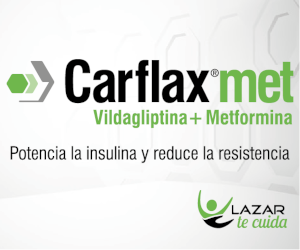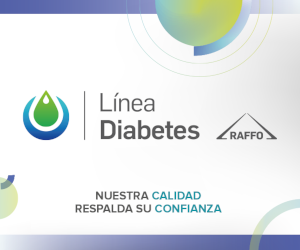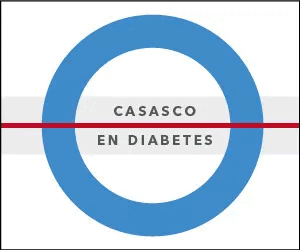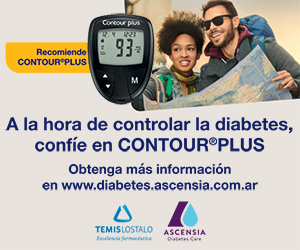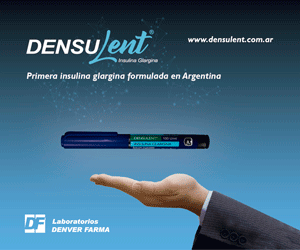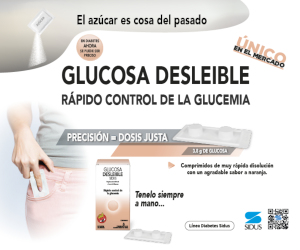Overweight and obesity in adults with type 1 diabetes mellitus
DOI:
https://doi.org/10.47196/diab.v53i3.171Keywords:
type 1 diabetes mellitus, obesity, overweightAbstract
Introduction: while the traditional idea has been that patients with type 1 diabetes mellitus (DM1) are thin, the prevalence of overweight and obesity has increased in parallel with the general population. Intensive treatment reduced microvascular complications, but generated overinsulinization, hypoglycemia, defensive intake and weight gain, with coexistence of elements of the metabolic syndrome.
Objectives: to determine the frequency of overweight, obesity and the associated risk factors and degree of insulin resistance in patients with DM1.
Patients and methods: 414 DM1 ≥18 years, women 52%, age 34.8±13.9 years of 14 departments of the province of Mendoza were stratified according to BMI in normal weight N, overweight and obesity. The following were analyzed: age, physical activity (PA) ≥3 times/week, HbA1c, LDL-C <100 mg/dL, HBP, level of education and insulin sensitivity according to the estimated rate of glucose disposition (ERGD) per Williams formula.
Results: overweight (OW) presented 34.2% and obesity (O) 10%. Women presented a higher frequency of normal weight than men (62% vs 49%; p=0.01), lower frequency of OW (28% vs 41%; p=0.005) and without difference of O (10% vs 9.5%; p=0.87). There was an increase in OW/O with age (p<0.0001). The systolic blood pressure (SBP) ≥130 mmHg was more frequent in O (54%) than in OW (29%) and in normal weight (16%) (p<0.0001). The ERGD was 9.14±1.64 mg/kg/min in the normal weight, 7.62±1.67 mg/kg/min in the OW and 6.02±2.20 mg/kg/min in the O (p<0.0001). LDL-C ≤100 mg/dL was percentage more frequent in normal weight (61%) than in OW (51%) and in O (46%) without reaching significant difference (p=0.08). There were no significant differences between the three groups in HbA1c, PA ≥3 times/week or in the level of instruction.
Conclusions: the frequency of OW/O in adult DM1 (44.2%) is high and like recent observations. The increase is marked between 25-50 years. OW/O was strongly associated with hypertension and insulin resistance. Weight control should be a priority goal in people with DM1.
References
Kjaer IGH, Kolle E, Hansen BH, Anderssen SA, Torstveit MK. Obesity prevalence in Norwegian adults assessed by body mass index, waist circumference and fat mass percentage. Clinical Obesity 2015; 5:211-8.
Szadkowska A, Madej A, Ziolkowska K, Szymanska M, Jeziorny K, Mianowska B, et al. Gender and age-dependent effect of type 1 diabetes on obesity and altered body composition in young adults. Annals of Agricultural and Environmental Medicine 2015; 22:124-8.
Libman IM, Becker DJ. Coexistence of type 1 and type 2 diabetes mellitus: “double” diabetes? Pediatric Diabetes 2003; 4:110-3.
Pozzilli P, Guglielmi C, Caprio S, Buzzetti R. Obesity, autoimmunity, and double diabetes in youth. Diabetes Care 2011 May; 34 Suppl: S166-70.
Petrie D, Lung TW, Rawshani A, Palmer AJ, Svensson AM, Eliasson B, Clarke P. Recent trends in life expectancy for people with type 1 diabetes in Sweden. Diabetologia 2016; 59:1167-76.
Rawshani A, Rawshani A, Franzén S, Eliasson B, Svensson AM, Miftaraj M, McGuire DK, Sattar N, Rosengren A, Gudbjörnsdottir S. Mortality and cardiovascular disease in type 1 and type 2 diabetes. N Engl J Med 2017; 376:1407-18.
Minges KE, Whittemore R, Grey M. Overweight and obesity in youth with type 1 diabetes. Annu Rev Nurs Res 2013; 31:47-69.
Liu LL, Lawrence JM, Davis C, Liese AD, Pettitt DJ, Pihoker C, Dabelea D, Hamman R, Waitzfelder B, Kahn HS; SEARCH for Diabetes in Youth Study Group. Prevalence of overweight and obesity in youth with diabetes in USA: the SEARCH for Diabetes in Youth study. Pediatr Diabetes 2010; 11: 4-11.
Conway B, Miller RG, Costacou T, Fried L, Kelsey S, Evans RW, Orchard TJ. Temporal patterns in overweight and obesity in type 1 diabetes. Diabet Med 2010; 27:398-404.
Price SA, Gorelik A, Fourlanos S, Colmana PG, Wentworth JM. Obesity is associated with retinopathy and macrovascular disease in type 1 diabetes. Obesity Research & Clinical Practice 2014; 8:e178-e182.
Vestberg D, Rosengren A, Olsson M, Gudbjörnsdottir S, Svensson AM, Lind M. Relationship between overweight and obesity with hospitalization for heart failure in 20.985 patients with type 1 diabetes. Diabetes Care 2013; 36: 2857-2861.
Caeiro G, Romero-González SA, Itria J, Waitman J. Type 1 diabetes and insulin resistance: estimated glucose disposal rate and its correlation with chronic complications. Revista de la Sociedad Argentina de Diabetes 2017; 51: 38-46.
Bohn B, Herbst A, Pfeifer M, Krakow D, Zimny S, Kopp F, et al.; for the DPV Initiative. Impact of physical activity on glycemic control and prevalence of cardiovascular risk factors in adults with type 1 diabetes: a cross-sectional multicenter study of 18.028 patients. Diabetes Care 2015; 38:1536-1543.
Tercera Encuesta Nacional de Factores de Riesgo para Enfermedades No Transmisibles. 10 de Julio de 2015. Buenos Aires, Argentina. ISBN: 978-950-38-0218-2
Collado-Mesa F, Colhount HM, Stevenst LK, Boavida J, Fullert J; the EURODIAB IDDM Complications Study. Prevalence and management of hypertension in type 1 diabetes mellitus in Europe: the EURODIAB IDDM Complications Study. Diabet Med 1999; 16: 41-49.
Gagliardino JJ, Aschner P, Likova H, Lavalle F, Ramachandran A, Kaddaha G, Mbanya JC, Shestakova M, Chantelot JM, Chan J. Frequency of high blood pressure and dyslipidemia in T1D and T2D: results from the International Diabetes Management Practices Study (IDMPS). ADA 2018: 621-P.
Williams KV, Erbey JR, Becker D, Arslanian S, Orchard TJ 2000 Can clinical factors estimate insulin resistance in type 1 diabetes? Diabetes 2000; 49: 626-632.
Pambianco G, Costacou T, Orchard TJ. The prediction of major outcomes of type 1 diabetes: a 12 year prospective evaluation of three separate definitions of the metabolic syndrome and their components and estimated glucose disposal rate: the Pittsburgh Epidemiology of Diabetes Complications Study experience. Diabetes Care 2007; 30:1248-1254.
Chillarón JJ, Goday A, Flores-Le-Roux JA, Benaiges D, Carrera MJ, Puig J, Cano-Pérez JF, Pedro-Botet J. Estimated glucose disposal rate in assessment of the metabolic syndrome and microvascular complications in patients with type 1 diabetes. J Clin Endocrinol Metab 2009; 94:3530-3534.
Corbin KD, Driscoll KA, Pratley RE, Smith SR, Maahs DM, Mayer-Davis EJ; on behalf of Advancing Care for Type 1 Diabetes and Obesity Network (ACT1ON). Obesity in type 1 diabetes: pathophysiology, clinical impact, and mechanisms. Endocrine Reviews 2018; 39:629-663.
Purnell JQ, Braffett BH, Zinman B, Gubitosi-Klug R A, Sivitz W, Bantle JP, Ziegler G, Cleary PA, Brunzell JD. Impact of excessive weight gain on cardiovascular outcomes in type 1 diabetes: results from the Diabetes Control and Complications Trial/Epidemiology of Diabetes Interventions and Complications (DCCT/EDIC) study. Diabetes Care 2017; 40:1756-1762.
Riddell MC, Gallen IW, Smart CE, Taplin CE, Adolfsson P, Lumb AN, Kowalski A, Rabasa-Lhoret R, McCrimmon RJ, Hume C, Annan F, Fournier PA, Graham C, Bode B, Galassetti P, Jones TW, Millan IS, Heise T, Peters AL, Petz A, Laffel LM. Exercise management in type 1 diabetes: a consensus statement. Lancet Diabetes Endocrinol 2017; 5:377-390.
Rodríguez M. Nutrición y ejercicio en las personas con diabetes. Rev ALAD 2017; 7: 40-49
Hanlan ME, Grffith J, Patel N, Jaser SS. Eating disorders and disordered eating in type 1 diabetes: prevalence, screening, and treatment options. Curr Diab Rep 2013; 13:909-916.
Goebel-Fabbri AE, Fikkan J, Franko DL, Pearson K, Anderson BJ, Weinger K. Insulin restriction and associated morbidity and mortality in women with type 1 diabetes. Diabetes Care 2008; 31:415-419.
Targher G, Bertolini L, Padovani R, Rodella S, Zoppini G, Pichiri I, Sorgato C, Zenari L, Bonora E. Prevalence of non-alcoholic fatty liver disease and its association with cardiovascular disease in patients with type 1 diabetes. J Hepatol. 2010; 53: 713-718.
Targher G, Mantovani A, Pichiri I, Mingolla L, Cavalieri V, Mantovani W, Pancheri S, Trombetta M, Zoppini G, Chonchol M, Byrne CD, Bonora E. Nonalcoholic fatty liver disease is independently associated with an increased incidence of chronic kidney disease in patients with type 1 diabetes. Diabetes Care 2014; 37:1729-1736.
Mantovani A, Rigolon R, Mingolla L, Pichiri I, Cavalieri V, Salvotelli L, Stoico V, Zoppini G, Bonora E, Targher G. Nonalcoholic fatty liver disease is associated with an increased prevalence of distal symmetric polyneuropathy in adult patients with type 1 diabetes. J Diabetes Complications 2017; 31:1021-1026.
Petrie JR, Chaturvedi N, Ford I, et al.; REMOVAL Study Group. Cardiovascular and metabolic effects of metformin in patients with type 1 diabetes (REMOVAL): a double-blind, randomised, placebo-controlled trial. Lancet Diabetes Endocrinol 2017; 5:597-609
Wang W, Liu H, Xiao S, Liu S, Li X, Yu P. Effects of insulin plus glucagon-like peptide-1 receptor agonists (GLP-1RAs) in treating type 1 diabetes mellitus: a systematic review and meta-analysis. Diabetes Ther 2017; 8:727-738.
Dandona P, Mathieu C, Phillip M, Hansen L, Griffen SC, Tschöpe D, Thorén F, Xu J, Langkilde AM; on behalf of the DEPICT-1 Investigators. Efficacy and safety of dapagliflozin in patients with inadequately controlled type 1 diabetes (DEPICT-1): 24-week results from a multicentre, double-blind, phase 3, randomised controlled trial. Lancet Diabetes Endocrinol 2017; 5: 864-76.
Guo H, Fang C, Huang Y, Pei Y, Chen L, Hu J. The efficacy and safety of DPP4 inhibitors in patients with type 1 diabetes: a systematic review and metanalysis. Diabetes Res Clin Pract 2016; 121:184-191.
Organización Mundial De La Salud. Informe Argentina 2017. Disponible en: http://administracionsalud.com.ar/organizacion-mundial-de-la-salud-informe-argentina-2017.
Downloads
Published
How to Cite
Issue
Section
License

This work is licensed under a Creative Commons Attribution-NonCommercial-NoDerivatives 4.0 International License.
Dirección Nacional de Derecho de Autor, Exp. N° 5.333.129. Instituto Nacional de la Propiedad Industrial, Marca «Revista de la Sociedad Argentina de Diabetes - Asociación Civil» N° de concesión 2.605.405 y N° de disposición 1.404/13.
La Revista de la SAD está licenciada bajo Licencia Creative Commons Atribución – No Comercial – Sin Obra Derivada 4.0 Internacional.
Por otra parte, la Revista SAD permite que los autores mantengan los derechos de autor sin restricciones.













